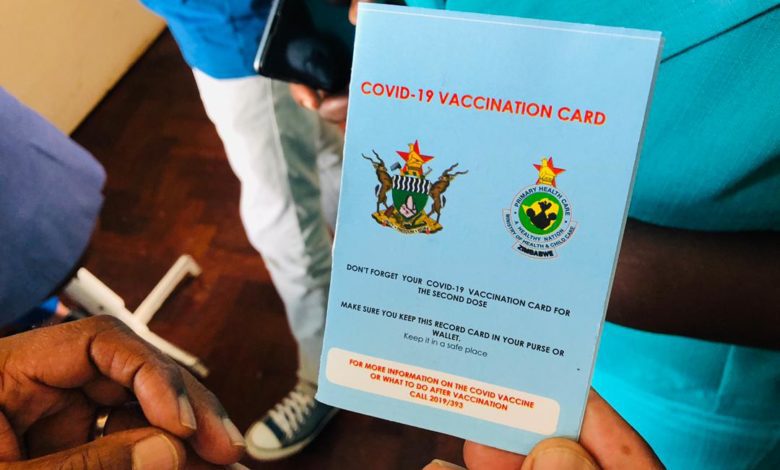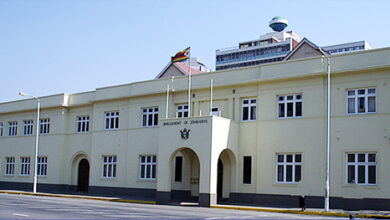
Zimbabwe’s plans to create vaccination certificates with ‘watertight’ security features are at an advanced stage, with the Central Bank’s affiliated Fidelity Printers and Refiners doing the printing, government officials have said.
These certificates will be used to prove that one has vaccinated and can be later used when one is travelling, as these would be linked to the international bar coding system.
Chief Director in the Ministry of Health and Child Care, Dr Maxwell Hove, said most importantly, these certificates would be fake proof.
“As you know we ended up with a lot of fake PCR certificates generated in the system but for vaccination, there are security features coming. In fact the new vaccination cards being printed will have security features that are almost similar to your money bills. These cards are actually printed by Fidelity Printers that prints the money.”
Dr Maxwell Hove, in Plumtree recently.
“In addition, we hope to put a Quick Response (QR) bar code that we want linked to the international bar coding system through the World Health Organisation (WHO) so that the certificate can be detected internationally. These certificates are going to be very important as we move into the future.”
Dr Hove said those who had been presented with vaccination cards that currently have no security features would have to change them.
“The information on your old card will be transferred to the new card, which has about five different security features. These features are critical and we will be able to flag and pick if anybody cheats or tries to print,” said Dr Hove.
As seen in other countries setting vaccine passports as pre-requirement for travel, Dr Hove said there might also come a time when people would probably be asked to present their vaccination certificates.
“There are even moves to try and produce vaccine passports. I’m sure you have heard about it. Those are developments that are coming. It’s important for all of us to be vaccinated. It’s in our interest as individuals,” he noted.
He further explained as part of international health regulations, Zimbabwe’s domestic vaccination certificate would be linked to WHO and other international organisations such as the International Civil Aviation Organisation (ICAO) who were still in process of working out the security features for the international vaccination certificate.
“As Zimbabwe we have to make sure that our QR code is ready when eventually the international one works,” he said.
“When somebody produces a Zimbabwean vaccination certificate whilst in Tokyo and if it’s scanned, scanners should be able to pick that this is a genuine Zimbabwe certificate.”
The same process would apply for foreigners, who having designed own certificates would be subject to the international coding that will have a standard QR code for everybody.
“When somebody comes from Botswana with a certificate linked to the WHO, that should be easily scanned like what we do with passports. If you take your passport to the airport today, it is scanned and that same passport in Kenya will be scanned to see if it’s a genuine passport. This is the same system that will eventually happen but it’s still work in progress for the international component,” Dr Hove said.
“For the Zimbabwean side and our vaccination certificate, the features are there. We are ready to roll.”
Deputy Minister of Health and Child Care, Dr John Mangwiro added that vaccine passport may soon take over the requirement of a negative PCR result certificate, highlighting the importance of vaccination.
“People will say show us your vaccine certificate, not temperature. What will you do? Will you say I am being discriminated against? People want to live,” he said.
The deputy minister claimed the Sinopharm and Sinovac vaccines that were use in Zimbabwe were safe.
“Vaccines that have recorded blood clots are Astra Zeneca and people in western countries are saying they don’t want them. Even the manufacturers themselves are refusing to take them. The Pfizer manufacturer himself refused to be given his own vaccine. As scientists we look and listen to that. Our neighbour South Africa has said, ‘No to Astra Zeneca’ after they saw the dangers. Should we go back and say let’s see what Astra Zeneca does to Zimbabweans? Should we do that?”
Dr John Mangwiro.
“Americans and Europeans are saying no to Johnson and Johnson, it’s a danger. Should we go and say let’s try it on Zimbabweans. As for Sinopharm -go read WHO that says it’s ahead no matter what you think or feel. We want to be safe, as you travel along the world you may be requested to produce these certificates and let’s not listen to gossip!”






